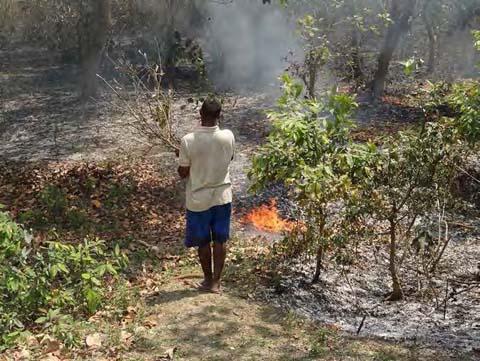Observations and Recommendations on Fire Management in Nepal
In April, 2013, Forester and Spatial Fire Analyst Chuck McHugh spent two weeks in Nepal providing comment and review of the Nepalese fire management program. His visit was coordinated with U.S. Forest Service International Programs, the U.S Agency for International Development (USAID), the U.S. Department of State, and World Wildlife Fund Nepal (WWF Nepal). He presented materials during a workshop and gave three other presentations to a variety of audiences including members of USAID, WWF Nepal, Embassy of the United States Kathmandu, Nepal’s Ministry of Forests and Soil Conservation (MoFSC), Nepal Police, local Community Forest User Groups (CFUGs), and the Nepal Institute of Forestry. He also visited several Forest Districts where he met with local managers, reviewed projects focused on reducing fire risk, and observed CFUGs suppressing active fires.
The primary objectives of the visit were to 1) attend the “Developing Forest Adaptation Strategies under Changing Climate Scenarios: Geospatial Support Systems for Improved Forest Fire Management” workshop and present an invited talk on “Geospatial Decision Support Tools for Modeling Wildland Fire”; 2) provide targeted technical support and comments regarding fire and fire management on the USAID-WWF Nepal funded Hariyo Ban Project; and 3) provide comments and observations to MoFSC regarding fire management issues in Nepal.
The workshop was attended by 30 senior officials from Bangladesh, Bhutan, India, Myanmar, Nepal, and Pakistan. McHugh was joined by experts from the U.S. Forest Service Remote Sensing Applications Center (RSAC), NASA, and SERVIR-Himalaya, an initiative at the International Centre for Integrated Mountain Development (ICIMOD) supported by USAID. The event included two days of technical training on operational forest fire detection and monitoring systems followed by a day-long discussion on fire and forest management policy. The workshop helped identify gaps in technology, capacity, and policy in the Hindu Kush Himalayan region and fostered regional cooperation for improving forest fire management.
McHugh concluded his trip with a formal briefing to MoFSC on his observations of fire and fire management in the country. He concluded that although Nepal faces many challenges as it continues to develop its fire management policy and response, these challenges offer many opportunities to address issues and formulate policy and strategies specific to Nepal’s unique circumstances.
Photo: Local CFUG using traditional firefighting methods observed on a wildfire along the East-West Highway on the Rupandehi Forest District on April 16, 2013.
